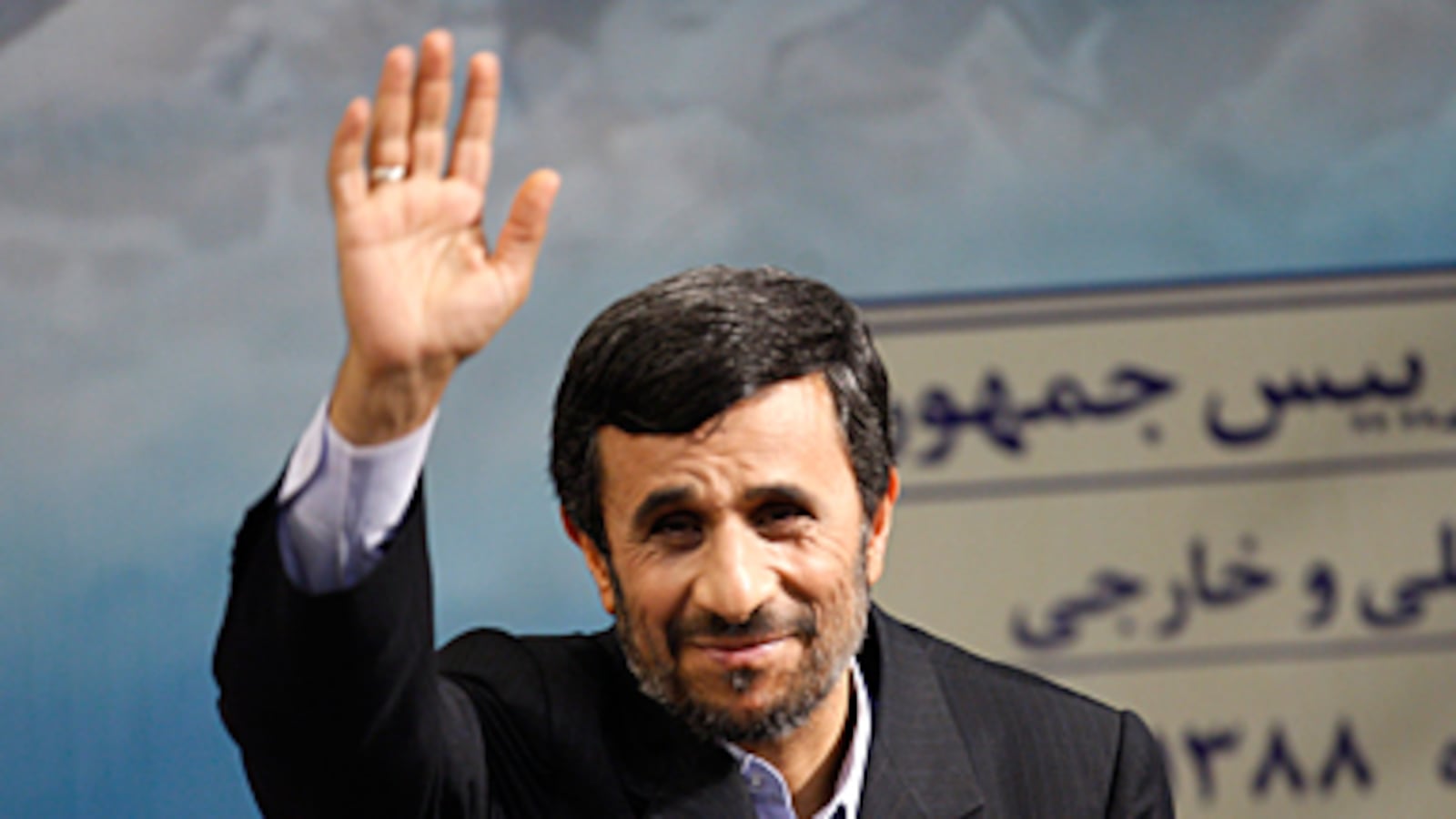America's favorite villain, President Mahmoud Ahmadinejad of Iran, turned a New York hotel into an annex of his dream palace last night. And by the time the party broke up, he seemed almost as deeply lost in surreal fantasies as his would-be destroyers in the White House.

The occasion was a dinner for several dozen people, among them retired diplomats, nuclear scientists and others, who, a few weeks ago, had received an invitation from the Iranian government to join an evening featuring “a frank exchange of views.” Ahmadinejad, in town for the UN General Assembly where he and President Obama are scheduled to speak today, has made this dinner party an annual event, if not always so easy to pull off.
Last year, he found it hard to find a New York venue willing to host the event as several hotels canceled on him. And the year before, hundreds of New Yorkers turned out to protest the party.
This year, however, Ahmadinejad’s dinner party took place without incident.
A slight man, Ahmadinejad has a ready smile and a demeanor that shifts between generous sympathy and firm resolution, and was evidently at ease playing the host.
Guests first convened at the Warwick Hotel for dinner, after being searched and screened by American security officers who protect visiting dignitaries. Surprisingly, the buffet was not normal hotel gruel but tasty Iranian fare, including stewed eggplant, three kinds of rice, and delightful fesenjan, a rich chicken stew made with pomegranate juice and ground walnuts. Naturally there was no alcohol, though at least one guest was spotted in the downstairs bar fortifying himself with a single malt before the event. In a concession to native customs, female guests were not asked to cover their heads.
Once dinner was over and guests had been shepherded upstairs, Ahmadinejad walked in without fanfare. He appeared happy and upbeat, chatting and even posing for photos with guests as bodyguards stood at a respectful distance. Some of the guests have been to these annual gatherings before, and several times Ahmadinejad insisted that one or another of them come back to Iran for another visit soon. Later, he said he would try to make it easier for Americans to travel to Iran, but added that it is nearly impossible for Iranians to visit the U.S. and "this naturaly has an effect."
A slight man, Ahmadinejad has a ready smile and a demeanor that shifts between generous sympathy and firm resolution, and was evidently at ease playing the host in New York. In a short speech and in conversation with his guests, he warned about nations that face a "legitimacy question" because they have not been chosen in free elections—and he wasn’t referring to Iran. Rather, he clarified, for those in doubt, his is a country where "people are not dealt with heavily when they express their views."
In his answers, Ahmadinejad often fell back on clichés rather than address the specifics of what he was asked. He railed against the injustice or the world system, said it was clear that the U.N. Security Council "cannot rule the world," and insisted that he was ready to meet President Obama at any time.
Ahmadinejad also asserted that Iran has no interest in acquiring nuclear weapons. "Even if they would allow it, we would not build such weapons," he said. Asked why the International Atomic Energy Agency has found Iran out of compliance with its treaty obligations, he alternated between insisting that the charge was wrong and that the IAEA was making it at America's behest. He repeatedly mentioned Israel's nuclear arsenal, asking—as do many in the world—why Israel is permitted to possess such weapons while Iran is not even accorded the right to enrich uranium.
Ahmadinejad's view of the U.S.-Iran relationship lacks subtlety, imagination and even honesty. So does the Obama administration's view of the relationship. Last night's after-dinner discussion confirmed the depressing reality of recent years. These two proud countries talk past each other. Much separates them: language, religion, history, geography, culture. They are united, however, in a death embrace that has made both of them believe they can maneuver their way out of confrontation—and that if confrontation comes, they will win.
This is the fundamental madness of what may be the most crazily skewed relationship in the world today. Together the U.S. and Iran might accomplish more in the Middle East than any pair of countries possibly could—starting with cooperation to stabilize Iraq and Afghanistan. They are so caught up in emotion, however, that they insist on remaining enemies and refuse to take steps that would benefit both.
Because the specialists who spent last evening with Ahmadinejad see this crazy reality, the dining room was filled with an intense and almost palpable sense of frustration. The U.S.-Iran confrontation is escalating dangerously; centrifuges are spinning as Iran's nuclear program advances; pressure to bomb Iran is rising in predictable quarters. Yet just about everyone in the room with Ahmadinejad agreed that the U.S. and Iran have deep and broad interests in common. By refusing to talk, each side harms the other—and itself. "At one point he seemed to be reviving the idea of a nuclear consortium, so if we need an entry point for broader talks, that's one we might be able to grab onto," mused William Luers, an eminent retired diplomat. But when asked if he thought the White House is looking for an "entry point," Luers shook his head and replied diplomatically, "I don't know."
Ahmadinejad complained repeatedly that the U.S. is interested only in pressing Iran to restrict its nuclear program, not in broader talks that could actually produce an accord. "If you define what the end of negotiations must be before you even begin, we are not able to negotiate," he said.
One nuclear expert in the room, Steven Miller, editor of the journal International Security, said he agreed with Ahmadinejad's perception that the U.S. does not want comprehensive talks with Iran.
"He is not entirely obtuse about what the relationship really is," Miller said. "He says we're essentially just playing for time, and he's right. The Obama administration views itself as engaged in a brilliant combination of carrots and sticks. The idea is to squeeze them and then, when we think they're hurting, turn warm and fuzzy for a few days to see if they've softened. You don't hear anyone talking about a real, broad-based resolution."
As the evening was ending, Frank G. Wisner, a former U.S. ambassador to Egypt, India and the Phillipines, posed the question on everyone's mind.
"If my assessment of common interests between the U.S. and Iran are accurate, do you, Mr. President, see any way for the U.S. and Iran to work in parallel or even work together?" he asked.
Ahmadinejad didn't say "No," but that's the real answer. Despite the immense benefits that an accord between these two countries might bring, neither Iranian nor American leaders are ready to pursue it.
Given both the urgency of the mounting U.S.-Iran crisis and the benefits that could accrue from trying to resolve it, logic might dictate that American diplomats would be taking advantage of Ahmadinejad's stay in New York. They should have been waiting outside his hotel, demanding that he talk with them. Talking, however, is not on either regime's agenda. That gave last night's dinner with Ahmadinejad an air of wistfulness tinged with growing fear.
After a couple of hours answering questions, Ahmadinejad thanked his guests and slipped out into the night. Lamentably, no American diplomats pursued him. He stepped quietly into a town car and was soon lost in midtown traffic. There are 30 years of missed opportunities between the U.S. and Iran. This was another one.
Stephen Kinzer is an award-winning foreign correspondent. His new book is Reset: Iran, Turkey and America's Future.






